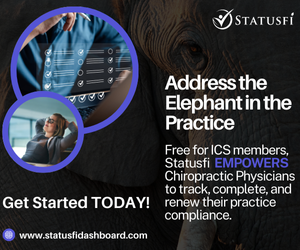
Self-Referral Law for Chiropractic Physicians

The Physician Self-Referral law (PSL), or Stark law, as it is sometimes called, limits physician referrals for Medicare and Medicaid patients when there is a financial relationship with the entity to which the patient is sent. This applies to “designated health services” which includes things like physical therapy, durable medical equipment, radiology, clinical laboratory services, and home health. “Financial relationships” includes ownership or investment interest, as well as compensation agreements. And, this all applies to immediate family members as well. (See Office of Inspector General’s (OIG) General Compliance Program Guidance (GCPG), published November 2023)
For example, if a physician has ownership in an imaging center, that provider can’t refer a Medicare beneficiary to that facility. And the imaging center is prohibited from billing Medicare, or any individual, third party payer, or other entity for the improperly referred designated health service. In a recent example, a chiropractor in South Carolina entered into a $9 million civil consent judgment relating to violations of the Stark law and False Claims Act. He owned several pain management clinics, laboratories, and a pharmacy, and was accused of referring to his own labs for services that were not medically necessary and lacked legitimate medical purpose. Proof of intent to violate this law is not required.
Penalties for violating the Stark law include repayment of all amounts received, possible monetary penalties, and exclusion from Federal programs. This means that the provider can no longer receive payment for treating Medicare and Medicaid patients.
There are some “safe harbors” that can be used to structure relationships that are not violations of the Anti-kickback statute or Self-referral law. (See Section 1877 of the Act, 42 U.S.C. § 1395nn; 42 C.F.R. §§ 411.350–11.389). For example, if one provider leases space to another, and there is a referral relationship, it might be considered a safe harbor if:
- It’s in writing and signed by both parties
- Covers all premises rented by the parties
- Is for at least one year
- Rental amount is set in advance
- Amount is consistent with fair market value
- The transaction would be considered “arm’s length”
- It is independent of the volume or value of Federal health care program referrals
- The space rented is not more than what is reasonably necessary to accomplish the business purpose of the rental
Note: This article is Part 3 of 5: Compliance Laws Every Chiropractic Physician Should Know
- Part 1: The False Claims Act for Chiropractic Physicians
- Part 2: Anti-Kickback Statute for Chiropractic Physicians
- Part 3: Self-Referral Law for Chiropractic Physicians
- Part 4: Exclusion Authority Requirements for Chiropractic Practices
- Part 5: Civil Monetary Penalties, OIG, and the Chiropractic Practice



















